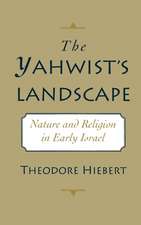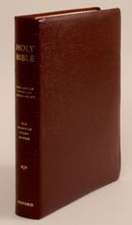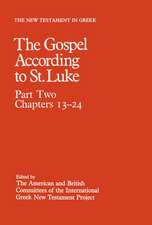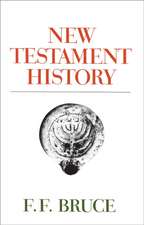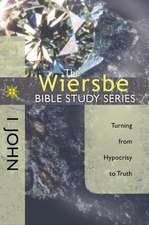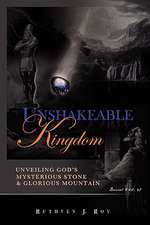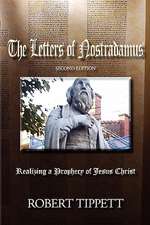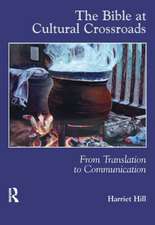Why Are There Differences in the Gospels?: What We Can Learn from Ancient Biography
Autor Michael R. Licona, Craig A. Evansen Limba Engleză Hardback – 12 ian 2017
Preț: 314.12 lei
Preț vechi: 380.66 lei
-17% Nou
Puncte Express: 471
Preț estimativ în valută:
60.11€ • 63.21$ • 49.67£
60.11€ • 63.21$ • 49.67£
Carte disponibilă
Livrare economică 17-22 martie
Livrare express 12-18 martie pentru 106.18 lei
Preluare comenzi: 021 569.72.76
Specificații
ISBN-13: 9780190264260
ISBN-10: 0190264268
Pagini: 336
Ilustrații: 3 illus.
Dimensiuni: 237 x 161 x 26 mm
Greutate: 0.64 kg
Editura: Oxford University Press
Colecția OUP USA
Locul publicării:New York, United States
ISBN-10: 0190264268
Pagini: 336
Ilustrații: 3 illus.
Dimensiuni: 237 x 161 x 26 mm
Greutate: 0.64 kg
Editura: Oxford University Press
Colecția OUP USA
Locul publicării:New York, United States
Recenzii
Besides its important contribution to our understandings of Gospel composition, Licona's book will be a helpful addition to the classroom. Its relaxed, even occasionally conversational tone, detailed notes and appendices, and glossary of technical and non-English terms make it accessible for students and experienced scholars alike.
The book is a valuable contribution to discussion of the genre of the gospels and of the historiographical propensities of their authors, incorporating detailed engagement with the primary sources and drawing judicious conclusions.
[Licona's] work deserves respect not only for its solid scholarship, but for the fact that he is seeking to understand and defend bilblical inerrancy by carefully analysis of the bilble itself.
Licona has written a well-researched and challenging work, and his knowledge of Roman rhetoric is impressive... In my view, the most helpful contribution of Licona's work is his analysis of the differences found in nineteen parallel Gospel accounts. This alone is worth the purchase of the book. His honesty in admitting that he knows no convincing harmonization with respect to some of these differences is refreshing and causes the reader to take his harmonizations more seriously than those of scholars who think that all such differences can easily be harmonized.
Licona should be applauded for helping his audience rethink their presuppositions about the Gospels by situating them among ancient Mediterranean biographies, rather than the modern kind, correcting a 'historical nearsightedness.' Moreover, the presentation is very reader friendly, with a glossary and appendices added to assist those lacking certain competencies. Interested readers can add this affordable volume to their libraries with confidence.
Licona's book is the most important book I've ever read on the literary techniques of the Evangelists. There is no book that has this finesse based on the Gospel genre as a "biography" and hence this study can be used with confidence in classes engaged in the Synoptic Gospels. His conclusions about how the Evangelists did what they did are reliable and give us yet one more clear glimpse in how to understand the nature of the Gospels.
It is helpfully detailed and demonstrates that those who question the historic reliability of the gospels are reading them in an uninformed way. Anyone teaching the gospels, or indeed anyone interested in apologetics who would wish to better equip themselves, would find this book very helpful.
The book is a valuable contribution to discussion of the genre of the gospels and of the historiographical propensities of their authors, incorporating detailed engagement with the primary sources and drawing judicious conclusions.
[Licona's] work deserves respect not only for its solid scholarship, but for the fact that he is seeking to understand and defend bilblical inerrancy by carefully analysis of the bilble itself.
Licona has written a well-researched and challenging work, and his knowledge of Roman rhetoric is impressive... In my view, the most helpful contribution of Licona's work is his analysis of the differences found in nineteen parallel Gospel accounts. This alone is worth the purchase of the book. His honesty in admitting that he knows no convincing harmonization with respect to some of these differences is refreshing and causes the reader to take his harmonizations more seriously than those of scholars who think that all such differences can easily be harmonized.
Licona should be applauded for helping his audience rethink their presuppositions about the Gospels by situating them among ancient Mediterranean biographies, rather than the modern kind, correcting a 'historical nearsightedness.' Moreover, the presentation is very reader friendly, with a glossary and appendices added to assist those lacking certain competencies. Interested readers can add this affordable volume to their libraries with confidence.
Licona's book is the most important book I've ever read on the literary techniques of the Evangelists. There is no book that has this finesse based on the Gospel genre as a "biography" and hence this study can be used with confidence in classes engaged in the Synoptic Gospels. His conclusions about how the Evangelists did what they did are reliable and give us yet one more clear glimpse in how to understand the nature of the Gospels.
It is helpfully detailed and demonstrates that those who question the historic reliability of the gospels are reading them in an uninformed way. Anyone teaching the gospels, or indeed anyone interested in apologetics who would wish to better equip themselves, would find this book very helpful.
Notă biografică
Michael R. Licona is Associate Professor of Theology at Houston Baptist University.

